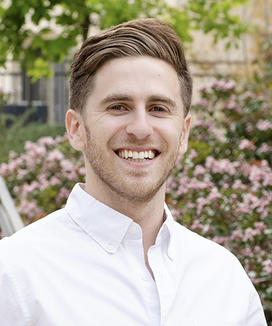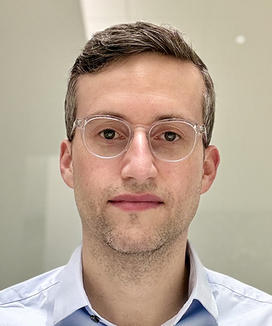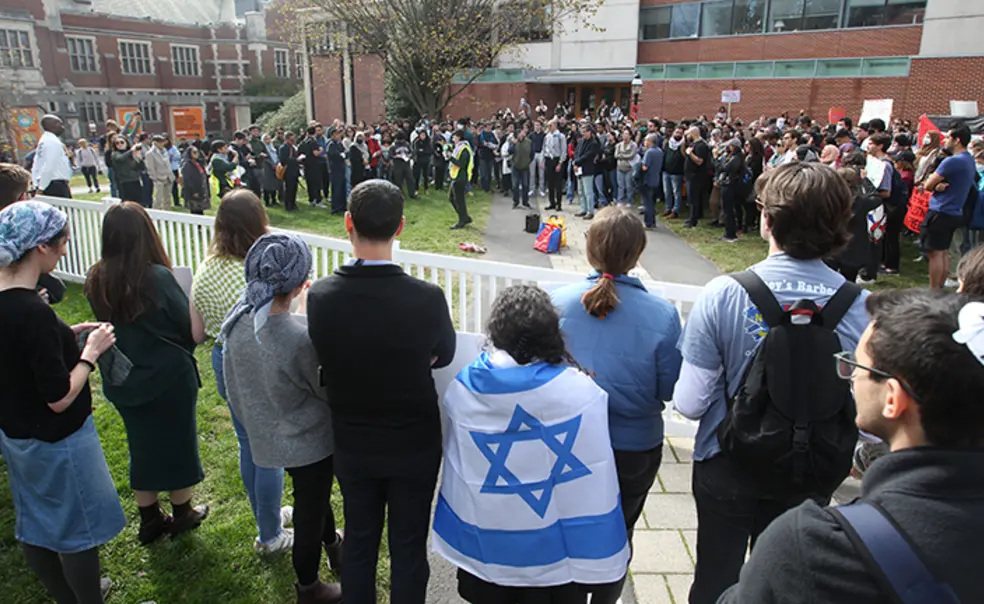Guest Essay: We’re Calling on Princeton to Do More to Fight Antisemitism on Campus
More than 1,800 alumni, students, faculty, and staff have signed a letter outlining steps the University should take
As PAW has compellingly demonstrated in recent recent articles, Hamas’ barbarous attacks on Israeli citizens hit close to home for many Princetonians. But the attacks’ aftermath has reached us all. Skyrocketing antisemitism has reverberated around the globe, and sure enough, it made its way through FitzRandolph Gate. Following two student-led pro-Intifada rallies, concerned students reached out to alumni about unchecked antisemitism on campus.

Our earliest drafts were reviewed by more than a dozen exceedingly talented alumni. Free speech lawyers, long-time peace activists, and prominent CEOs opined on the letter’s blindspots. Their criticisms were often sharp, unforgiving, and perfectly placed. We had a “Princeton moment” — a sense that we were fortunate to be surrounded by brilliant minds who enthusiastically pursued social progress.
As we spent long hours collaborating and sharing the letter, we learned that each of us had a personal connection to fighting antisemitism. Growing up as a Jew in Venezuela, Leon was accustomed to bomb threats, swastika graffiti, and violent crime plaguing his community. He named his first son after his grandfather — a survivor of the Nazi death camp, Auschwitz-Birkenau. Jacob, also the grandson of Holocaust survivors, was an IDF soldier whose unit has helped defend Israel from Hamas in 2018 and 2019. To us, antisemitic violence is not a nightmare that lies at the bottom of a slippery slope argument; it is a living, breathing evil which must be decisively confronted.

As alumni, we want current students to guide campus discourse. We had our turn, and now it is theirs. But as Princeton occupies a prominent place in both our personal identities and our national conversation, we have reason to make our voices heard when something is awry. And when exasperated students turn to us and other alumni for help, something is awry.
They ask if it has always been like this: if students were always afraid to share their political views; if professors and mental health counselors were always this openly partisan; if protestors and counter-protestors always shouted from opposite lips of a canyon.
Many alumni have indicated a resounding answer: No. One writes, “I don’t remember any of this back in my Princeton years of the early ’70s.” Another told us, “It is a sad devolution from the open environment Princeton used to be.” A ’90s graduate said she is “terribly disappointed in Princeton … for the first time in over 30 years.”
As proud advocates of free speech, it was paramount we thread the needle between condemning certain speech without advocating for its suppression. We are not in the business of turning down the temperature on campus; the Israel-Hamas war elicits a spectrum of emotions, and students’ dialogue ought to accommodate them all.
But we strongly believe that there is room for leadership amid the back and forth. Leaders are meant to be beacons of moral clarity. They are meant to remind us of the principles which initially drew us together. Amongst those values, two feel particularly absent: Respect for our interlocutors’ opinions, and respect for our interlocutors, period. Vigorous, sharp, and even offensive debate can still proceed. But when our arguments are needlessly laden with tropes, slurs, and even cases of physical harassment, we have lost our way.
With the utmost respect and highest expectations for our beloved alma mater, we beseech University administration: be a leading voice against antisemitism. Not only is it your moral imperative to do so, but it is also aligned with your expressed values. President Eisgruber recently told us all to confront racism “wherever and whenever” it rears its head. According to more than 1,800 Princeton University community members, that time is now.












6 Responses
Norman Ravitch *62
1 Year AgoWhat We Are Forgetting Here
Regarding the essay calling on Princeton to fight antisemitism (On the Campus, January issue): We are forgetting that there is a perfectly decent way to criticize the policies of the IDF and Bibi Netanyahu’s clique without antisemitism and without making Jewish students fearful. The Israeli policies are, in my view, genocidal, and I also think plenty of American and other Jews not living in Israel are fully aware of this, whether they say so or not. I wonder if all the talk about antisemitism is not an effort by the ultra-Zionists to make the issues here seem about hatred when they are really about decency and humane values. How anyone, Christian, Muslim, or Jew, can view what is left of Gaza after the Israeli actions since Oct. 7, 2023, without horror is beyond me!
Tom Tonon *71
2 Years AgoBDS is a Valid, Nonviolent Approach
In his comment here, Mr. Hill claims that the Boycott, Divest, and Sanction (BDS) movement originated by Palestinians is “illiberal and eliminationist,” and he wonders if it’s anything other than “a network of intimidation and surveillance aimed at silencing and punishing.”
BDS is a civil, nonviolent method to end some of the most severe violations of human rights in history. Such a movement helped to successfully bring down the apartheid system in South Africa, and hopefully it can lead to similar results in Israel.
What amazes me is that most everyone condemns the violent efforts that Hamas and other Palestinians make in their resistance to Israel, but even when they propose rational, nonviolent, and peaceful methods, they are also severely criticized.
Robert Hill ’00
2 Years AgoAfter Oct. 7, BDS Has No Place at Princeton
The recent open letter from the new Princeton Faculty for Justice in Palestine (FJP) group deplores the “culture of intimidation, silencing, and punishment” directed towards dissident voices “by networks of propaganda, intimidation, and surveillance.” Illogically, FJP also declares its support for “an academic and cultural boycott of Israel and Israeli educational institutions,” i.e. the Boycott, Divestment, and Sanctions (BDS) movement. What is the BDS movement if not a network of intimidation and surveillance aimed at silencing and punishing?
Several of the signatories to the FJP letter hold appointments in the Department of Near Eastern Studies, which has an institutional membership in the Middle Eastern Studies Association (MESA), which in 2022 endorsed BDS. BDS’s delegitimization of Israel is eliminationist in both intent and effect. Hamas has confirmed for the world what eliminationism ultimately means in practice. After Oct. 7, Princeton should not maintain institutional memberships in, or otherwise support the work of, academic organizations which endorse the illiberal and eliminationist BDS movement.
Tom Tonon *71
2 Years AgoCondemn Hamas
I condemn Hamas.
For what?
Murdering
Who?
Children
Civilians
Innocents.
And Israelis are . . .
Condemn Hamas!
Yes.
For what?
Murdering
Who?
Children
Civilians
Innocents.
But Israelis are now . . .
Condemn Hamas!!
I do!
For what?
Murdering
Children
Civilians
Innocents!
What took you so long?
But Israelis are now committing . . .
Condemn Hamas!!!
I do!
For what?
Murdering!
Children!
Civilians!
Innocents!
But, please, Israelis are now . . .
What?
Making phone calls
Right
Texting people to run
Right.
“Most moral army”
Right.
Alvin S. Felzenberg *78
2 Years AgoAlumni Letter on Antisemitism
Have the authors any concrete suggestions on what Princeton could do to counter antisemitism?
Richard M. Waugaman ’70
2 Years AgoCriticizing Israel Is Not Inherently Antisemitic
Antisemitism is abhorrent, as is Islamophobia. The latter term was promulgated by my friend, Princeton’s former professor Akbar Ahmed; along with a rabbi. I worry that cynical efforts to silence critics of Israel by accusing them of being antisemites until proven otherwise may paradoxically increase antisemitism, as Jews and gentiles alike learn more about concealed truths concerning Israel’s long history of threatening, imprisoning, expelling, and killing the Palestinians.
In the shocking Israeli documentary The Gatekeepers, all the living former directors of Shin Bet, Israel’s internal security service, admitted that longstanding Israeli mistreatment of the Palestinians has simply created more terrorists. And we’ve learned Benjamin Netanyahu has long tolerated Hamas (which most Palestinians detest, and which will not collaborate with the Palestinian Authority in the West Bank) so as to undermine a two-state solution.
Yes, we absolutely need to condemn Hamas terrorism. But that doesn’t mean Israel is innocent. As the late Palestinian scholar Edward Said ’57 remarked of his people, “We’re the victims of the victims,” alluding, of course, to the Holocaust.